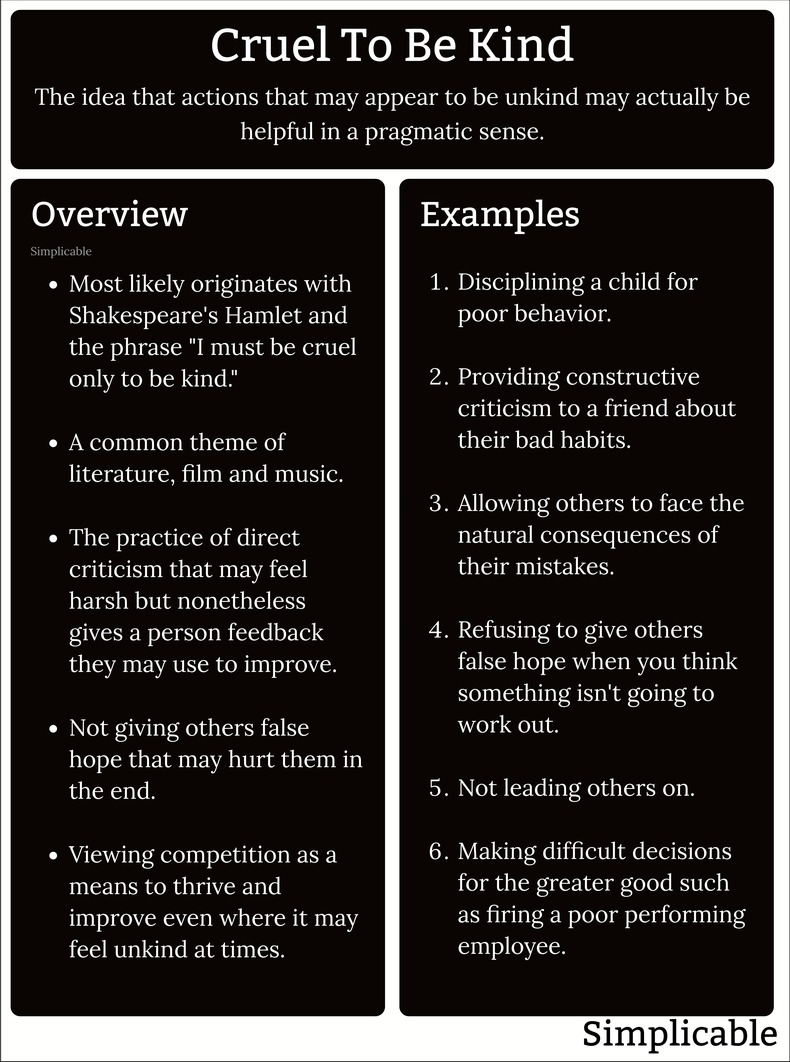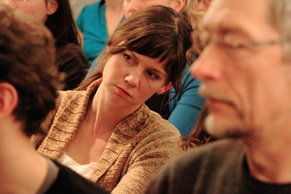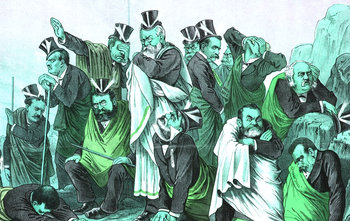
I must be cruel only to be kindCruel to be kind is the idea that actions that on the surface are unkind may be kind in the pragmatic sense that they help someone. The concept apparently originates with Hamlet with the quote above. Hamlet says this after strongly admonishing his mother for disrespecting the memory of his father. As a concept, cruel to be kind makes frequent appearances in modern literature, film and songs. The following are illustrative examples of the meaning of this phrase.
~ Hamlet Act 3, scene 4, 173–179
Direct Criticism
Cruel to be kind would suggest that direct criticism is sometimes required even if it may be upsetting. This can be contrasted with saving face whereby individuals are never criticized directly in order to avoid embarrassing them. This may encourage mediocrity whereby subpar performance flourishes. Direct criticism is conductive to improvement and resilience as it provides more candid knowledge of performance and knowledge of results.Cold Shoulder
Cold shoulder is the practice of acting disinterested in someone to convey a hint. This is done to subtly communicate that you aren't interested in a social or business relationship with an individual. This can be contrasted with "leading someone on" whereby you pretend to be interested in someone when you aren't. While the latter may appear to be kind in a superficial way, the former is actually more kind because it doesn't set someone up for disappointment.False Hope
False hope is the belief that something is possible or likely when in fact it is hopelessly improbable. Deflating someone's false hope will be perceived as unkind but may be intended to help them. For example, a judge at a talent show who clearly communicates that someone is a terrible singer may help that person to avoid later disappoint and wasted effort. Encouraging false hope may appear to be kind and perhaps it is kind but from a pragmatic perspective, this is likely to set someone up for disappointment.Competition
Competition is the struggle to outdo others. This may feel quite unkind but is the foundation for human achievement, self-improvement, growth, resilience and discovery. For example, an airline that is run as a state monopoly may be happy with high fares, an accident rate of 145 per million flights and a customer satisfaction rate of 1%. In the presence of competition, airlines must work to streamline costs, reduce prices, improve safety and maintain reasonable customer satisfaction as they will lose all business if they don't do these things. Likewise, individuals are driven to constantly improve themselves because they are faced with competition in every aspect of life. People naturally enjoy competition in forms such as business, games and sport where it is often described as a type of peak experience.Greater Good
A leader who makes difficult and unpopular decisions for the greater good. For example, a small business owner who implements cost cuts that are unpopular with employees but are designed to prevent the business from failing.Summary
Cruel to be kind is a well known concept that states that seemingly negative actions are sometimes intended to be in the best interests of others.
Discussion
False hope may be harmless or may even be beneficial where it is making someone happy without causing them to waste their potential. Likewise, it is common for people to wrongly assess the potential of others. For example, it is common for unusually successful people to recount instances where they were told they have no talent early in their careers.| Overview: Cruel To Be Kind | ||
Type | ||
Definition | The idea that actions that on the surface are unkind may be kind in the pragmatic sense that they help someone. | |
Related Concepts | ||






























